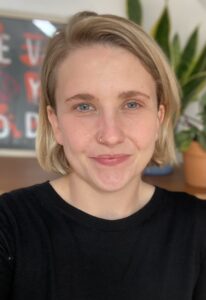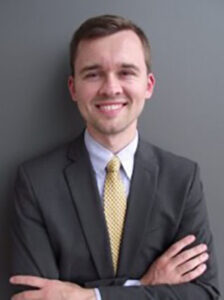Placements
At Vanderbilt, we are dedicated to training the next generation of scholars to join the professoriate. Our Ph.D.’s have earned tenure-track positions at schools such as Rutgers University, Boston College, University of Connecticut, University of Arkansas, Ohio State, and University of North Carolina-Chapel Hill. In addition, our graduates have been awarded postdoctoral fellowships at major research institutes like the Duke University Aging Center and the Brown University Population Studies and Training Center.
RACHEL MCKANE ’20
 Assistant Professor at Brandeis University
Assistant Professor at Brandeis University
Rachel’s research addresses questions at the intersection of structural inequality, urban development, and environmental change. At Vanderbilt, Rachel studied environmental justice and environmental sociology under Dr. David Hess and participated in numerous interdisciplinary collaborations. After graduation, they accepted a position as a post-doctoral research associate at Brown University in the Population Studies and Training Center. In their new position at Brandeis University as the Jack Meyerhoff Chair of American Environmental Studies, they will continue to study environmental (in)justice and processes of urban change rooted in historic structural inequality, uneven development, and racial capitalism. They will also expand their work on mutual aid as an adaptive strategy for building community resilience in the era of climate change.
Reflecting on their time at Vanderbilt, Rachel said, “I received incredible mentorship and support from Dr. David Hess and rigorous methodological training from folks in the Sociology Department and beyond.”
Adviser: David Hess
Philip J. Pettis ’23
Assistant Professor at Michigan State University
Philip’s research examines how sexual orientation, race/ethnicity, gender, age, and SES intersect to shape social, economic, and health inequalities. Under the tutelage of Dr. Lijun Song, Philip learned to apply a diverse set of theoretical frameworks including race/ethnicity studies, sexualities studies, medical sociology, and social psychology. He matches his theoretical diversity with methodological breadth, employing social network analysis, survey methods, and in-depth interviews and ethnographic observation. In his position as assistant professor at Michigan State University, he will apply what the skills and knowledge accumulated at Vanderbilt to the thematic area of Sexual and Gender Minority Health Research at MSU.
Adviser: Lijun Song
Ryan Talbert ’20
 Assistant Professor at University of Connecticut
Assistant Professor at University of Connecticut
While at Vanderbilt, Ryan studied the intersection of health and race under Dr. Christie-Mizell, learning to utilize quantitative methods and insights from multiple theoretical perspectives including the stress process model, life course theory, and intersectionality. In his position as assistant professor at the University of Connecticut, he has applied what he learned at Vanderbilt and developed a robust research agenda. An example of the type of research Ryan engages in is his work on the mental health significance of proximity to public Confederate monuments, and the long-term health effects of Ku Klux Klan terrorism on communities.
When we asked Ryan what he found most useful about his time here, he said, “the rigorous, unparalleled, and hands-on mentoring I received. The low student/faculty ratio is indicative of Vanderbilt’s approach to mentorship.”
Adviser: André Christie-Mizell
Quan D. Mai ’18
 Assistant Professor at Rutgers University-New Brunswick
Assistant Professor at Rutgers University-New Brunswick
While at Vanderbilt, Quan studied social movements under Dr. Isaac, and work and occupations under Dr. Cornfield, while specializing advanced quantitative methods. At Rutgers University he has applied what he learned at Vanderbilt to a research agenda that explores how a range of social relations—including racial relations, employment relations, state regulatory capacity, and social movements—combine in the economy, polity, and urban spaces to influence processes of social stratification.
Quan remembers his time at Vanderbilt fondly. He told us, “I can honestly say that I spent some of the best years of my life being a graduate student in Garland Hall. The mentorship that I received is unparalleled, and I will be forever indebted to my mentors at Vandy. They not only took me under their wings but also led by examples in showing me how to operate as a respected scholar, caring teacher, generous mentor, collegial community-member, and kind human being.”
Advisers: Larry Isaac and Dan Cornfield

